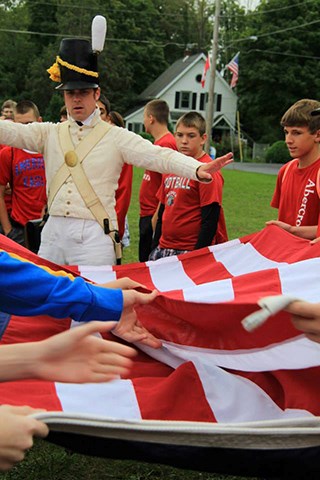
NPS photo
Will our democratic experiment survive?
In the decades following the Revolutionary War, Americans faced these challenging questions and forged many answers in this second conflict with the British. Today, Americans may be familiar with some of the legendary and iconic symbols forged during the War of 1812: the Defense of Baltimore that sparked the creation of our national anthem, the burning of the White House and Capitol, the Battle of New Orleans, and the exploits of USS Constitution (Old Ironsides). But most Americans have overlooked the War’s many internal and external conflicts that continue to shape our national identity.
The War of 1812 involved a wide range of people who fought for vastly different goals. Native Americans saw the struggle as one of cultural survival with the potential of rolling back European expansion. The British and many British subjects in Canada saw the conflict as a defensive war to prevent the United States from conquering Canada. Americans themselves were divided over the conflict as many believed it to be an ill-conceived land grab while others saw it as a necessary action to protect American rights and fulfill the legacy of the Revolution.
The Bicentennial of the War of 1812 provides a singular opportunity for the National Park Service to challenge and enable Americans and our neighbors to reexamine and connect with the stories and people of a momentous yet neglected and misunderstood conflict that firmly established our republic.
Historic places provide a palpable connection to the past and, since its inception, the National Park Service has both preserved and relied on the authenticity of place to interpret America’s past.
Through the commemoration of the War of 1812, the National Park Service will invite all to learn and to share more about the participants, their motives, and their actions, and to reflect upon the causes and consequences of the war. To this end, Servicewide goals are:
Exploring the full diversity of America. We will engage multiple audiences through a broad range of media and learning opportunities and invite multiple perspectives on the war and its lasting effects.
Increasing lifelong learning. We will move beyond a narrow history of the battlefields to address the larger economic, social, and political issues of the war and to draw connections to these issues today so that our audiences can experience civic engagement beyond the boundaries of the park.
Embracing a 21st-century mission. We will create new collaborative models, working with partners who were once enemies in the conflict to preserve and to interpret distinctive heritage resources.
Invigorating stewardship. We will contribute to a more adaptive, innovative, and responsive organization by increasing our professional capacities to identify, interpret and protect sites associated with the military, political, intellectual, economic, and social history of the war.
Last updated: February 26, 2014
